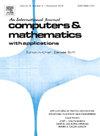裁剪几何上Stokes问题的等几何离散化
IF 2.5
2区 数学
Q1 MATHEMATICS, APPLIED
引用次数: 0
摘要
我们研究了在裁剪域中Stokes问题的等几何近似,其中底层网格不适合物理域边界,对执行基本边界条件提出了挑战。我们引入了三种等几何元素族(Raviart-Thomas、nsamdsamlec和Taylor-Hood),并使用它们来离散问题。广泛使用的Nitsche方法[1]通常用于解决此问题。然而,我们发现Nitsche方法在某些退化的裁剪域构型中缺乏稳定性,可能会污染计算结果。我们的补救办法是双重的。一方面,我们局部地改变了弱公式中速度的法向导数的取值(推广了[2]中介绍的泊松问题的方法);另一方面,我们修改了离散压力的空间,消除了与修剪不良的元素相关的自由度。我们证明了这种方法恢复了速度双线性形式的矫顽力。虽然数值结果表明我们的方法恢复了离散问题的自适应稳定性,但仍然缺乏严格的数学证明。我们证明了最优的先验误差估计,并提供了数值实验来验证理论,重点验证了我们的方法的稳定性。本文章由计算机程序翻译,如有差异,请以英文原文为准。
Isogeometric discretizations of the Stokes problem on trimmed geometries
We investigate the isogeometric approximation of the Stokes problem in a trimmed domain, where the underlying mesh is not fitted to the physical domain boundary, posing a challenge for enforcing essential boundary conditions. We introduce three families of isogeometric elements (Raviart-Thomas, Nédélec, and Taylor-Hood) and use them to discretize the problem. The widely used Nitsche method [1] is commonly employed to address this issue. However, we identify that the Nitsche method lacks stability in certain degenerate trimmed domain configurations, potentially polluting the computed solutions. Our remedy is twofold. On the one hand, we locally change the evaluation of the normal derivatives of the velocities in the weak formulation (generalizing the procedure introduced for the Poisson problem in [2]); on the other, we modify the space of the discrete pressures, eliminating the degrees of freedom associated with badly trimmed elements. We demonstrate that this approach restores the coercivity of the bilinear form for the velocities. Although numerical results show that our method restores the inf-sup stability of the discrete problem, a rigorous mathematical proof is still missing. We prove optimal a priori error estimates and provide numerical experiments to validate the theory, emphasizing the validation of the inf-sup stability of our method.
求助全文
通过发布文献求助,成功后即可免费获取论文全文。
去求助
来源期刊

Computers & Mathematics with Applications
工程技术-计算机:跨学科应用
CiteScore
5.10
自引率
10.30%
发文量
396
审稿时长
9.9 weeks
期刊介绍:
Computers & Mathematics with Applications provides a medium of exchange for those engaged in fields contributing to building successful simulations for science and engineering using Partial Differential Equations (PDEs).
 求助内容:
求助内容: 应助结果提醒方式:
应助结果提醒方式:


